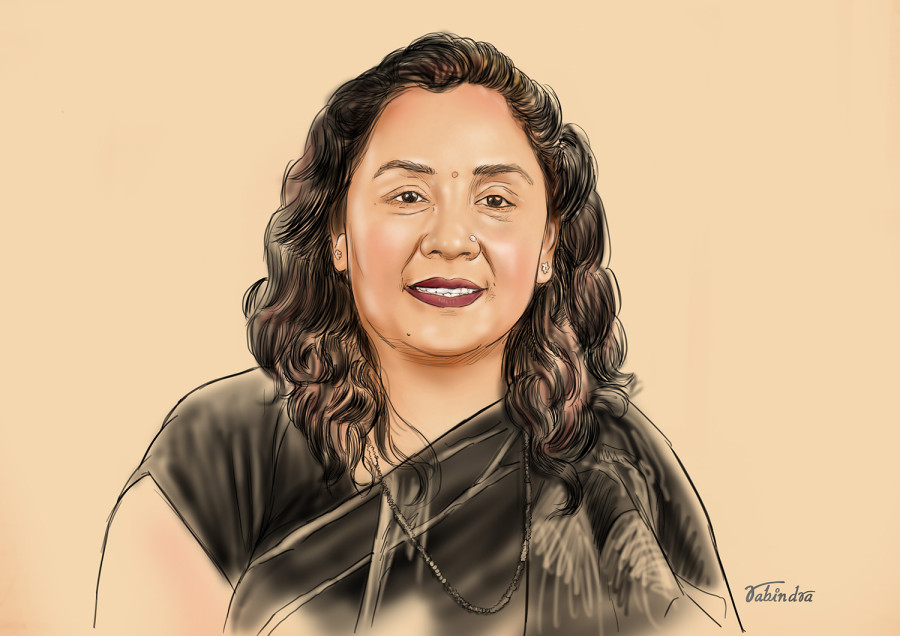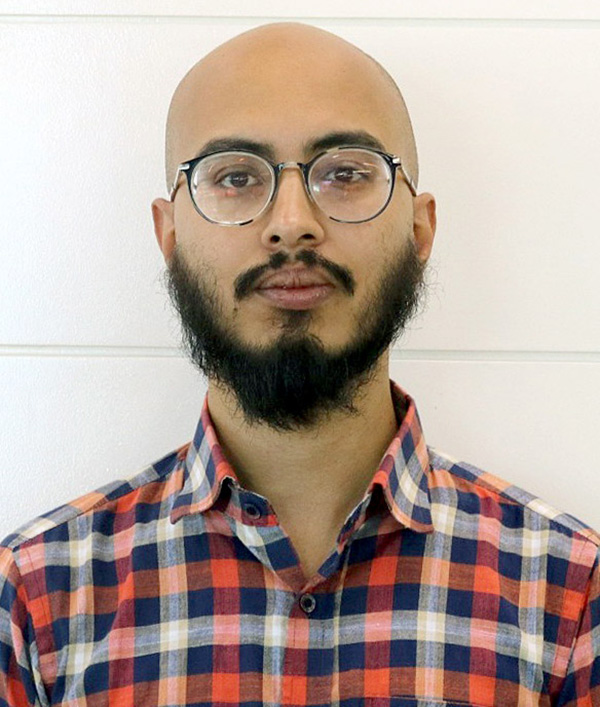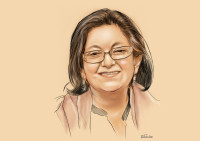Brunch with the Post
Anupama Khunjeli: Women should have the confidence to demand what we want
Nepal’s first female CEO of a commercial bank talks about how her institution is encouraging women entrepreneurs and how women need to prioritise their careers.
Pranaya SJB Rana
Growing up, Anupama Khunjeli wanted to become a sportsperson. She played squash, badminton and tennis while in school and college, competing alongside the boys and winning. But after studying accounting, Khunjeli would end up in banking, going on to become Nepal’s first female CEO of a major commercial bank.
I wait for Khunjeli at The Old House in Durbar Marg. The place is generally quiet, has good food and is close to where Khunjeli works—at Kamaladi’s Rising Mall, where Mega Bank has its headquarters. But this particular day, there is construction taking place outside so I opt for a seat inside the restaurant’s colonial building.
Khunjeli arrives shortly and we sit down to lunch at a table in one corner of the room. We get to talking and she tells me about her nearly three decades in banking.
“I was studying at Shankar Dev in 1991 when I decided to apply for a job at ANZ Grindlays Bank,” she says.
She started as a teller for Grindlays, which was later absorbed by Standard Chartered, where she continued working for 13 years. After that, she moved to Nabil Bank, where she worked for six years. But it was only when a group of like-minded individuals decided to step out on their own and start their own bank that things really changed.
Mega Bank was founded in 2010, with Anil Keshari Shah as its founding CEO and Khunjeli as its Deputy General Manager and Chief Operating Officer. She quickly moved up the corporate ladder, becoming general manager, then deputy CEO and finally, in April last year, becoming Nepal’s first female CEO.
“In a way, it was a breaking of the glass ceiling,” she says. “You don’t see women CEOs around. But the board had been observing me for eight years and they decided to give me the opportunity.”
Mega Bank is different, Khunjeli tells me, which is perhaps why it was the first bank to appoint a woman to the top leadership position, especially in an industry dominated by men. The bank’s board includes tourism entrepreneurs, educationists, and small business owners, and it functions with the support of 3,000 “promoters” and more than 200,000 shareholders from middle-class families, Khunjeli says.
“It was a new idea we started,” she says. “There’s no one particular individual or family that owns the organisation.”
In just nine years since its founding, the bank has managed to become quite successful, with 208 branches spread out across 63 districts. Mega Bank will soon acquire Gandaki Bikas Bank, expanding their network even more. Khunjeli, as a senior manager, definitely had a lot to do with that success, but she is not one to take credit.
“Ultimately, it’s the human resource that makes or breaks an organisation,” she says. “It hasn’t been easy but our success gives us a lot of happiness and all the zeal to move forward.”
We order lunch, both of us choose fish, but before we can talk quietly over our food, we realise that a party of 10 or so young people have arrived and they are so loud within the confines of that old building that we can hardly hear ourselves talk. But I push through, just hoping to make the best of it.
I am not interested so much in the low-down on banking, for I am woefully inept when it comes to finances and economics. My interest really lies in Khunjeli’s experiences. When so many bank managers and CEOs are power suit-wearing men, what has it been like for Khunjeli?
“We have to keep proving ourselves and this will continue until it is common to have lady CEOs in many institutions,” she says. “Until we see more women in decision-making positions, things will be difficult. But to get there, we women have to help each other. We have to ensure that we are supportive of each other.”
At Mega Bank, they have tried to include more women, not just as tellers but also as mid-level and senior managers, according to Khunjeli.
“Currently, 42 percent of our senior management team comprises of women,” she says. “We started with 60 percent women but now because of mergers and acquisitions, the numbers have gone a bit below 50 percent. There are women in mid-management and senior management. There are women on the way up.”
The bank has also adopted policies that are in line with Nepal Rastra Bank’s regulations to encourage more women to start businesses and enterprises. Mega Bank has a separate microfinance unit for loans up to 15 lakhs and this unit makes sure that women entrepreneurs in small and medium enterprises are supported, says Khunjeli.
“Under our Corporate Social Responsibility, we also support the education of one girl child for each branch. We want them to study until the 12th grade and after that, we want them to work with us, so they can support their further studies and then come back as a full-time team member,” she says.
Currently, they support 208 girls, one for each branch. But that number is likely to go up with their acquisition of Gandaki Bikas Bank. This is an important initiative for Khunjeli, as she believes that education and opportunity are big change-makers in the lives of young girls.
“Even today, families save money for their daughter’s wedding when they should be spending it on their education,” she says. “When your daughter is educated, confident and has a job before marriage, her standing is totally different, even after she is married.”
But she also believes that perception makes a big difference. Women need to be able to see other women in leadership positions so they can aspire to that position themselves. It’s about the optics but it is also about substance.
“At meetings of the Nepal Bankers’ Association, I see just one woman CEO,” she says. “But there’s Asha Rana Adhikary [Deputy CEO] of Sunrise Bank and Arati Rana [Assistant General Manager] of Global IME and our bank itself has Raveena Desraj Shrestha [Deputy CEO]. One good thing is that Nepal Rastra Bank has come up with a regulation that says that you need to have at least one female board member. So that’s started to have some impact.”
A lot of what needs to change, she says, is the attitude of our society when it comes to working women and women having careers of their own.
“Even in urban areas, we are still not comfortable with women working hard all day and coming home late,” she says. “There is still a barrier to daughters and daughters-in-law when it comes to a career. We feel that they should be at home, taking care of the household but then, if they have a career, they should be doing well there too.”
It is this dual responsibility that prevents women from rising to the top echelons of organisations. Men are never expected to balance their home and work life but women are constantly expected to be good homemakers and also have fulfilling careers.
So on the one hand, women are able to work and rise to mid-management but they aren’t able to go any further to decision-making positions because they are overburdened. But in the end, Khunjeli believes it is the women themselves who have to make a decision and decide in favour of their careers, if they choose to work.
“Don’t think of going two ways and balance home life and work life. If you try to do that, then you’ll be a mediocre person in a mid-level position,” she says. “If you want to make a career for yourself then give yourself that freedom to focus on your career. You have to be vigilant to be able to identify any opportunities, and you have to be hardworking.”
Khunjeli believes in hard work, something she learned early in her career working for an international bank. That’s why she’s not willing to rest on her laurels.
“As a CEO, I can always look at myself in two ways. I can think that I’ve reached the top or I could think, I’m just at the base camp and there’s a lot more that I need to do,” she says. “I would really like to contribute in a big way to making sure that there are a lot of women entrepreneurs who come up.”
Hard work can get you to the top but you will have to work your way up, no one will hand you what you want on a platter. If you want something, you need to work for it and when you have enough to show, you demand it, says Khunjeli.
“There’s a statistic that says women ask [for a raise] four times less than men,” she says. “We have to be able to ask for what we want. First, we have to produce results and then we have to make sure we are noticed. We should have the confidence to demand what we want. We need to have that aspiration, that ambition.”
ON THE MENU
The Old House, Durbar Marg
Mint lemonade: Rs 336
Fresh fruit juice: Rs 336
Chef’s special salmon salad: Rs 575
Pan-fried trout with sweet lime: Rs 1,964




 9.89°C Kathmandu
9.89°C Kathmandu



.jpg&w=200&height=120)






